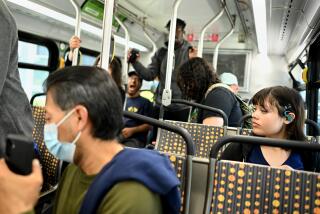Freewheelin’ : Son Turns His Back on His Father’s Car Crusade
- Share via
ARCATA, Calif. — There was a day when Jan Lundberg was a master of the fossil fuel universe, living large in Los Angeles with his Mercedes, his yacht and his hired help.
He compiled gas station surveys, including the respected Lundberg Letter, which his late father, Dan Lundberg, founded in 1955, earning a comfortable living while helping oil companies increase market share. But something was wrong.
“L.A.,” he says, “was killing me.”
Now he’s a 44-year-old vegetarian with a ponytail, clogs and a pant leg perpetually stuffed in his sock to keep his bike chain from eating it.
And the automobile is no longer his deity. It’s his demon.
Lundberg defected to Arcata, a small Northern California college town and environmentalist haven. Here, he and a staff of scruffy volunteers publish the Auto-Free Times, a journal of “revolutionary ecology and economics” and “road-fighting news.”
It’s all part of his work to rid the Earth of cars and the pavement they roll on. And he has a battle cry that would pain most commuters in car-loving California and beyond.
“Our message is not, ‘Hand over your car keys,’ and not, ‘We want to rip up this road,’ but, ‘Let us join together to stop new road construction,’ ” says Lundberg, who heads the feisty Alliance for a Paving Moratorium, a coalition of more than 130 anti-highway groups worldwide.
Lundberg walks the walk. He sold his car in 1989, opting instead to walk, ride a bike or, on longer trips, use public transportation.
“Jan has a wonderful wide-eyed and radical view,” says Ernest Callenbach, a Berkeley-based lecturer and author. In 1975, Callenbach published “Ecotopia,” one of the first books to advocate a life in which autos play a minor role.
Since that time, the number of cars worldwide has increased 60% while the population has increased 30%, environmentalists say.
That has led to more cars than people in the United States--a major reason Lundberg predicts the world will be out of oil in 25 years.
“Where are those antiwar protesters from the ‘60s?” Lundberg asks. “Many of them are in their homes, consuming.”
Though he was an activist at UCLA in the early 1970s, Lundberg is the first to admit he set aside his radical ways, in large part to please his father, and join the family business.
“I was probably the highest-paid 21-year-old in town,” Lundberg says.
By the time of his father’s death in 1986, Jan was the Lundberg Letter’s editor. Dan Lundberg was a petroleum celebrity--a former CBS reporter, he had become a fixture in the media during the energy crises of the 1970s.
“It started to get pretty interesting when we predicted the second oil shock of 1979,” Lundberg said. “That really put us on the map.”
Through it all, Lundberg says his father was also an environmentalist who raised his family on an organic ranch and took his five children on extended sailing trips to ports around the world.
His father’s death was a turning point. It allowed Jan Lundberg an opportunity to take hold of his own destiny as he drove from gas station to gas station, tabulating half-cent changes in gas prices.
“I decided: ‘I hate this. I’m not going to pay people to do something I hate,’ ” Lundberg recalls.
His sister, Trilby, still runs what is now known as the Lundberg Survey. Jan--who hasn’t spoken to his sister in years--split from the family after his father died.
“She’s in a different world. She lives in the past,” Lundberg said.
Trilby Lundberg did not return calls seeking comment.
Jan Lundberg says his father probably wouldn’t think much of his work as an activist, or of his dreams--a moratorium on roads and parking lots, turning pavement into parks and adding bike lanes to major freeways.
His activism even led to his arrest this year during a mass bike ride on state Highway 101 to save ancient redwoods in the nearby Headwaters Forest. A judge in Eureka dropped most of the charges against him.
During his short jail stint, Lundberg happened to meet 31-year-old Steve Palmer, a former wholesale auto-parts salesman who recently left Los Angeles.
He, too, has permanently parked his car.
“But I have misgivings about selling it because I don’t want it back on the road,” said Palmer, who lives in a tent in nearby McKinleyville and has become one of Lundberg’s volunteers.
Lundberg’s daughter, Vernell, unlike most 16-year-olds, has no interest in getting a driver’s license. She’s broken the law by climbing Headwaters Forest redwoods; she’s embarking on a cross-country tour of environmental rallies to sing “ecomusic” she and her father compose.
Soon, Jan hopes to pursue his music full-time and hand over the Alliance, which is funded by grants and donations, to his volunteers.
Asked how they make a living, Lundberg, Palmer and many others in Arcata say they help each other out.
They get their bikes fixed for free at the Anarchy Bike shop. Many have more than one job and share or trade whatever skills and goods they have. A local newspaper columnist, for example, plays the banjo on the street to subsidize his income.
“Even though we don’t always live up to our own values, sometimes we return,” Lundberg said, as he and others stood in the Arcata town square eating bread and cups of pea soup dished out by the local chapter of Food Not Bombs, a hunger relief organization.
As he walked back to his office, Lundberg yelled to two passersby.
“Down with cars, right?”
The two smiled and flashed him a couple of thumbs down.
More to Read
Sign up for Essential California
The most important California stories and recommendations in your inbox every morning.
You may occasionally receive promotional content from the Los Angeles Times.













